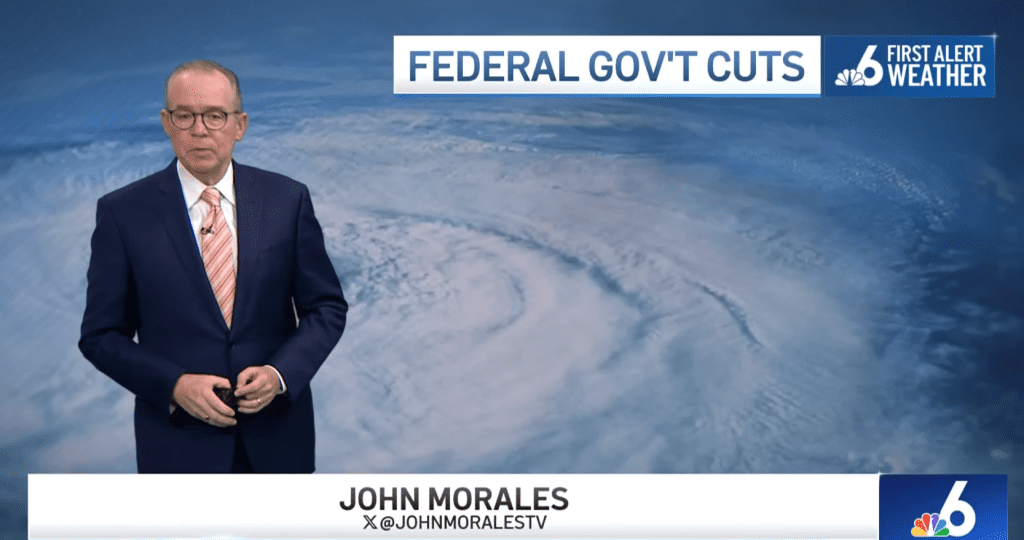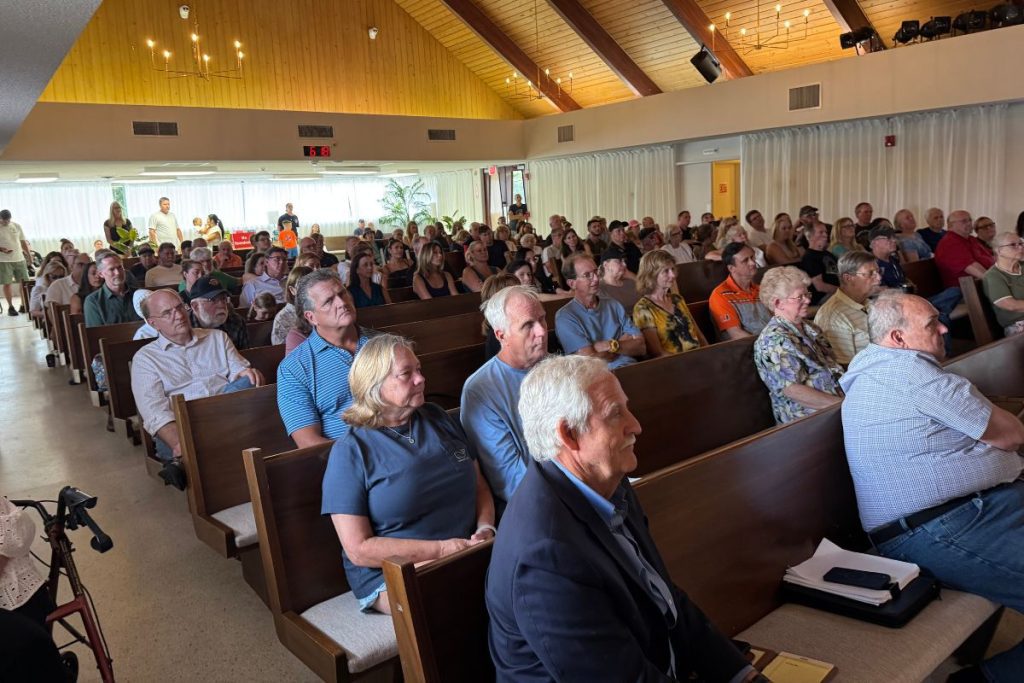Before June 1, Boca Raton and Delray Beach issued their annual pleas to residents about preparing for hurricane season. This year, though, the bigger question is whether the federal government will be prepared for what storm scientists believe will be another above-average storm year.
Last week, a South Florida TV meteorologist issued an unprecedented warning to his audience. Because of federal budget cuts and management upheaval, John Morales said, he no longer could be sure of what he tells viewers.
Morales recalled how in 2019 he predicted with confidence that Category 5 Hurricane Dorian would stay off the coast. It did, smashing into the Bahamas. This year, Morales said, he probably could not issue any prediction with similar confidence.

Disruption is happening across the federal government under the second Trump administration. In no area does it affect South Florida more, though, than when it comes to disaster preparedness and response.
President Donald Trump first appointed Cameron Hamilton to be interim director of the Federal Emergency Management Agency (FEMA); this came after Trump suggested eliminating FEMA and leaving disaster response to the states. Hamilton has no relevant experience, but he testified before Congress that abolishing the agency would be a mistake. One day later, he was fired and replaced with David Richardson. He also has no relevant experience. Richardson said of potential critics, “I will run right over you.”
Ending FEMA would rattle Florida. The Tampa Bay Times reported that the state has received $8.5 billion in disaster assistance in the last 14 years. Over the last two decades—beginning with the resurgent storm years of 2004 and 2005—the state has received nearly $30 billion.
According to a city spokeswoman, Delray Beach has received nearly $19 million from FEMA since 2004. Boca Raton has received $31 million. Most of that has been for first-responder overtime and debris removal. Local governments normally get back 90% of those costs.
Gov. Ron DeSantis weighed in. “You hear these different things and know the media is trying to make an issue of FEMA this or that,” he said. “Just know in Florida, our preparations and our immediate response always assumed FEMA wouldn’t be there for us, OK?”
However, Florida always has assumed a role for FEMA, including the $8.5 billion over 14 years. U.S. Rep. Jared Moskowitz, a Democrat who served as the state’s emergency management director under DeSantis, predicted that FEMA will “fail” and warned of serious consequences for the state if that happens. Example: Reimbursements were critical to recovery on the southwest coast after Hurricane Ian in 2022.
Trina Sheets is executive director of the association that represents state emergency managers. She told the New York Times last month, “There’s no plan in writing for how FEMA intends to respond during this disaster season. Things seem to be changing on a daily basis.”
According to news reports, FEMA at this time last year had 6,588 trained staffers to deploy after disasters. As of Wednesday, it had 1,952. Those cuts came from Elon Musk’s Department of Government Efficiency (DOGE), which also caused the firing of hundreds of weather forecasters. Some are being rehired.
Those with relevant experience acknowledge the need to change FEMA. Moskowitz and Byron Donalds, a Republican from Florida, want to separate the agency from the massive Department of Homeland Security.
DHS Sec. Kristi Noem said Trump wants disaster response “to be led by those who know best.” But would the Legislature—which still hasn’t passed a budget because of differences over taxes and spending— set aside similar money if FEMA went away? If not, cities would be on their own.
The spending bill under debate in Congress would cut FEMA’s budget. I’ll have more as the legislation progresses.
Debates over townhouse proposal

Neighbors who opposed an adult living facility (ALF) near Addison Mizner School in Boca Raton seem to be just as opposed to a townhouse project on the site.
Last week, Whelchel Partners held a community meeting about the company’s proposal for 42 townhouses on the roughly 3.5-acre property at the north end of Boca Square on land that is now home to a church. Roughly 80 people attended. No one spoke in favor except the development team.
Holli Sutton’s home abuts the site on the south side. She organized opposition to the 128-bed, three-story ALF, which the city killed in 2021. Last week, she was collecting petitions against the project, posting on social media that she had received 63, with more to come. As with the ALF, homeowners are putting out yard signs in opposition.
Sutton told me that neighbors dispute the developer’s traffic study showing minimal impact to the neighborhood. Another point of dispute is Whelchel’s assertion that the site is not suitable for single-family homes because it abuts Palmetto Park Road, a major thoroughfare. Neighbors contend that the north side of the site is on Southwest 12th Avenue as it curves before intersecting with Palmetto Park Road.
Ele Zachariades is Whelchel’s attorney. She called the meeting “disappointing” because she hoped the forum would produce suggestions to make the project more compatible. Only two came up: a less modern design, and a structure across the street to announce the entrance to Boca Square. It could go on city land where a fire station once stood.
Zachariades also argued that higher density is suitable for the property because of its proximity to Palmetto Park Road. It would be a proper transition, she said, into the single-family neighborhood. “This is not new. It’s done in the city, the state, the country and the world.”
One round of staff comments came back in March. Zachariades said Whelchel resubmitted its plan last Friday, based on the meeting. After the next comments come back, “We will regroup internally.”
Boca’s downtown project inches forward
One small part of Boca Raton’s planned massive downtown redevelopment goes to the planning and zoning board tonight.
It’s the move of the Ricketts House, which dates to 1939, from Crawford Boulevard north of City Hall to the city mausoleum and cemetery. The house had served as an office for the Singing Pines Children’s Museum before it closed. Redevelopment will displace all structures at that site.
The museum building is being moved to Meadows Park. The Ricketts House will serve as an office for the employees at the mausoleum and cemetery.
More apartments proposed in Boca
Also on the board’s agenda is the proposal for a 289-unit apartment building at 900 NW Broken Sound Parkway. It is another project submitted under the new commercial industrial multi-family development (CIMD) designation that arose from the state’s Live Local Act.
Because the area is already so densely developed, there likely will be little opposition. The seven-story project would include a first-floor workout/entertainment area open to the public. The staff recommends approval.
Delray Beach gets top votes

For the second straight year, USA Today 10Best readers again have named Delray Beach’s municipal beach the best in Florida. This comes after the beach won another Blue Flag designation.
P.S.
On Tuesday, I wrote that Delray Beach Mayor Tom Carney and City Commissioners Juli Casale and Thomas Markert did not attend the annual police ball. The police union and the commission are at odds over a new contract. Carney said he and others “were not invited” to the event.







